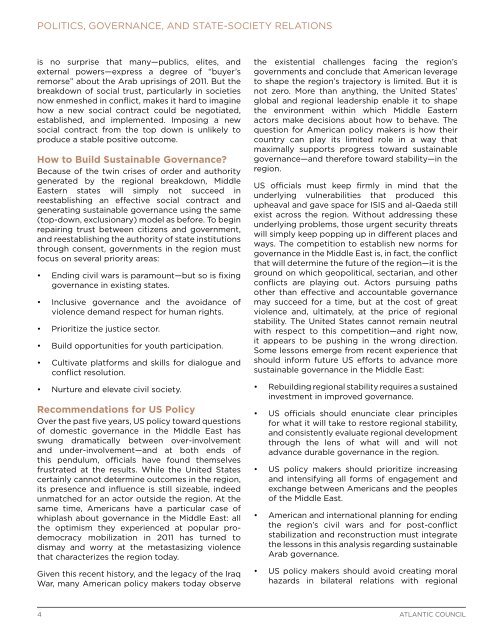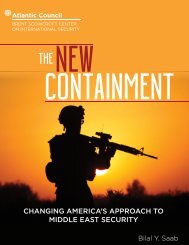POLITICS GOVERNANCE STATE-SOCIETY RELATIONS
Politics_Governance_and_State-Society_Relations_web_1121
Politics_Governance_and_State-Society_Relations_web_1121
Create successful ePaper yourself
Turn your PDF publications into a flip-book with our unique Google optimized e-Paper software.
<strong>POLITICS</strong>, <strong>GOVERNANCE</strong>, AND <strong>STATE</strong>-<strong>SOCIETY</strong> <strong>RELATIONS</strong><br />
is no surprise that many—publics, elites, and<br />
external powers—express a degree of “buyer’s<br />
remorse” about the Arab uprisings of 2011. But the<br />
breakdown of social trust, particularly in societies<br />
now enmeshed in conflict, makes it hard to imagine<br />
how a new social contract could be negotiated,<br />
established, and implemented. Imposing a new<br />
social contract from the top down is unlikely to<br />
produce a stable positive outcome.<br />
How to Build Sustainable Governance?<br />
Because of the twin crises of order and authority<br />
generated by the regional breakdown, Middle<br />
Eastern states will simply not succeed in<br />
reestablishing an effective social contract and<br />
generating sustainable governance using the same<br />
(top-down, exclusionary) model as before. To begin<br />
repairing trust between citizens and government,<br />
and reestablishing the authority of state institutions<br />
through consent, governments in the region must<br />
focus on several priority areas:<br />
• Ending civil wars is paramount—but so is fixing<br />
governance in existing states.<br />
• Inclusive governance and the avoidance of<br />
violence demand respect for human rights.<br />
• Prioritize the justice sector.<br />
• Build opportunities for youth participation.<br />
• Cultivate platforms and skills for dialogue and<br />
conflict resolution.<br />
• Nurture and elevate civil society.<br />
Recommendations for US Policy<br />
Over the past five years, US policy toward questions<br />
of domestic governance in the Middle East has<br />
swung dramatically between over-involvement<br />
and under-involvement—and at both ends of<br />
this pendulum, officials have found themselves<br />
frustrated at the results. While the United States<br />
certainly cannot determine outcomes in the region,<br />
its presence and influence is still sizeable, indeed<br />
unmatched for an actor outside the region. At the<br />
same time, Americans have a particular case of<br />
whiplash about governance in the Middle East: all<br />
the optimism they experienced at popular prodemocracy<br />
mobilization in 2011 has turned to<br />
dismay and worry at the metastasizing violence<br />
that characterizes the region today.<br />
Given this recent history, and the legacy of the Iraq<br />
War, many American policy makers today observe<br />
the existential challenges facing the region’s<br />
governments and conclude that American leverage<br />
to shape the region’s trajectory is limited. But it is<br />
not zero. More than anything, the United States’<br />
global and regional leadership enable it to shape<br />
the environment within which Middle Eastern<br />
actors make decisions about how to behave. The<br />
question for American policy makers is how their<br />
country can play its limited role in a way that<br />
maximally supports progress toward sustainable<br />
governance—and therefore toward stability—in the<br />
region.<br />
US officials must keep firmly in mind that the<br />
underlying vulnerabilities that produced this<br />
upheaval and gave space for ISIS and al-Qaeda still<br />
exist across the region. Without addressing these<br />
underlying problems, those urgent security threats<br />
will simply keep popping up in different places and<br />
ways. The competition to establish new norms for<br />
governance in the Middle East is, in fact, the conflict<br />
that will determine the future of the region—it is the<br />
ground on which geopolitical, sectarian, and other<br />
conflicts are playing out. Actors pursuing paths<br />
other than effective and accountable governance<br />
may succeed for a time, but at the cost of great<br />
violence and, ultimately, at the price of regional<br />
stability. The United States cannot remain neutral<br />
with respect to this competition—and right now,<br />
it appears to be pushing in the wrong direction.<br />
Some lessons emerge from recent experience that<br />
should inform future US efforts to advance more<br />
sustainable governance in the Middle East:<br />
• Rebuilding regional stability requires a sustained<br />
investment in improved governance.<br />
• US officials should enunciate clear principles<br />
for what it will take to restore regional stability,<br />
and consistently evaluate regional development<br />
through the lens of what will and will not<br />
advance durable governance in the region.<br />
• US policy makers should prioritize increasing<br />
and intensifying all forms of engagement and<br />
exchange between Americans and the peoples<br />
of the Middle East.<br />
• American and international planning for ending<br />
the region’s civil wars and for post-conflict<br />
stabilization and reconstruction must integrate<br />
the lessons in this analysis regarding sustainable<br />
Arab governance.<br />
• US policy makers should avoid creating moral<br />
hazards in bilateral relations with regional<br />
4 ATLANTIC COUNCIL



